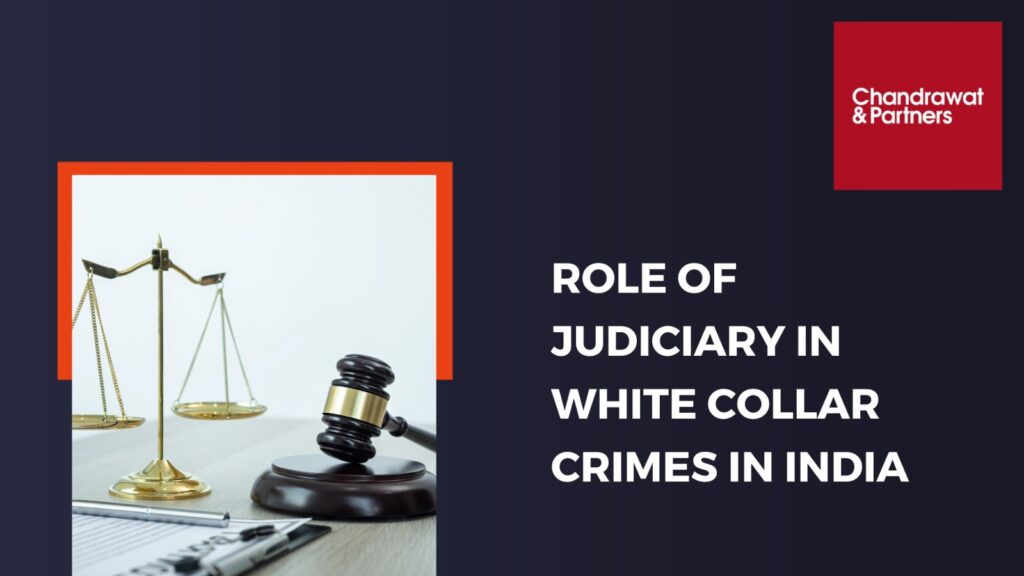The Role of the Judiciary in containing white-collar Crime in India
Introduction
White-collar crime is a pervasive and detrimental form of criminal activity perpetrated by high-level professionals who abuse their social, economic, and technological power for personal and corporate gain. This category encompasses a wide range of non-violent offenses, including fraud and unauthorized financial activities. Despite its far-reaching consequences, quantifying the extent of white-collar crime is challenging, as it often goes unreported and is not included in standard crime statistics.
The Law Commission’s 47th Report highlighted the need to sensitize the judiciary, especially at lower levels, to the severe economic and societal implications of white-collar crimes. In India, the judiciary, particularly the Supreme Court, holds significant authority across various domains and has been committed to combating corruption and holding white-collar criminals accountable, regardless of their status or government affiliation. Articles 32 and 226 of the Indian Constitution empower the judiciary to conduct judicial reviews, further strengthening its role.
Is White-Collar Crime a Crime?
Indeed, white-collar crime constitutes a genuine and substantial threat to society, exerting a more significant economic toll than the combined impact of thefts, robberies, burglaries, and dacoities. Several factors contribute to the societal acceptance of these crimes, including their complex nature, often comprehensible only to professionals well-versed in the intricacies of corporate law. The convoluted regulations governing the business world sometimes work in favor of criminals by obscuring the link between their actions and motives. White-collar crime erodes the foundation of the economy and erodes public trust in principles of fairness and ethical governance.
Laws Pertaining to White-Collar Crimes in India
Several legislative measures have been enacted in India to address white-collar crimes:
- Fugitive Economic Offenders Act, 2018: This law facilitates the handling of individuals who flee India to evade justice by confiscating their assets and properties to compensate for the harm they’ve caused. However, the Act applies only to financial obligations exceeding $100 million, leaving smaller offences unaddressed.
- Prevention of Money Laundering Act, 2005: This legislation has been instrumental in curbing domestic money laundering, extending its reach internationally to combat-related activities. While it has successfully tackled many aspects of white-collar crime, technological advancements and the emergence of cryptocurrencies have posed new challenges that require updated legislation.
- Indian Penal Code, 1860: Sections 403, 405, and 415 of the IPC provide for the punishment of white-collar crimes. However, the IPC falls short of comprehensively defining and addressing the intricate nature of white-collar offences, such as counterfeiting, corruption, bribery, and fraud.
Role of the Judiciary
The judiciary in India plays a pivotal role in interpreting and applying the law and resolving disputes between citizens and the state. Courts have the authority to review government actions to ensure their conformity with the Constitution and enacted legislation. India’s judicial system has evolved significantly throughout history, adapting to the changing landscape of crime and society.
In today’s era of economic liberalization and globalization, white-collar crime has emerged as a prominent form of economic wrongdoing. The judiciary is instrumental in addressing the legal complexities associated with these offences, thereby contributing to societal self-regulation.
Conclusion
The concept of natural justice serves as the foundation for administering justice, emphasizing that no individual should preside over their own case. This ethical principle extends to judicial proceedings, highlighting the importance of impartiality. Therefore, judges should not adjudicate matters in which they have a personal interest.
In conclusion, white-collar crime is a grave concern in India, with far-reaching consequences for the nation’s economy and ethical values. While legislative measures exist to combat these offences, the judiciary plays a crucial role in interpreting and enforcing the law. A robust and impartial judiciary is essential to effectively contain white-collar crime, promote accountability, and uphold the principles of justice and fairness in society.
For more information or queries, please email us at
[email protected]




